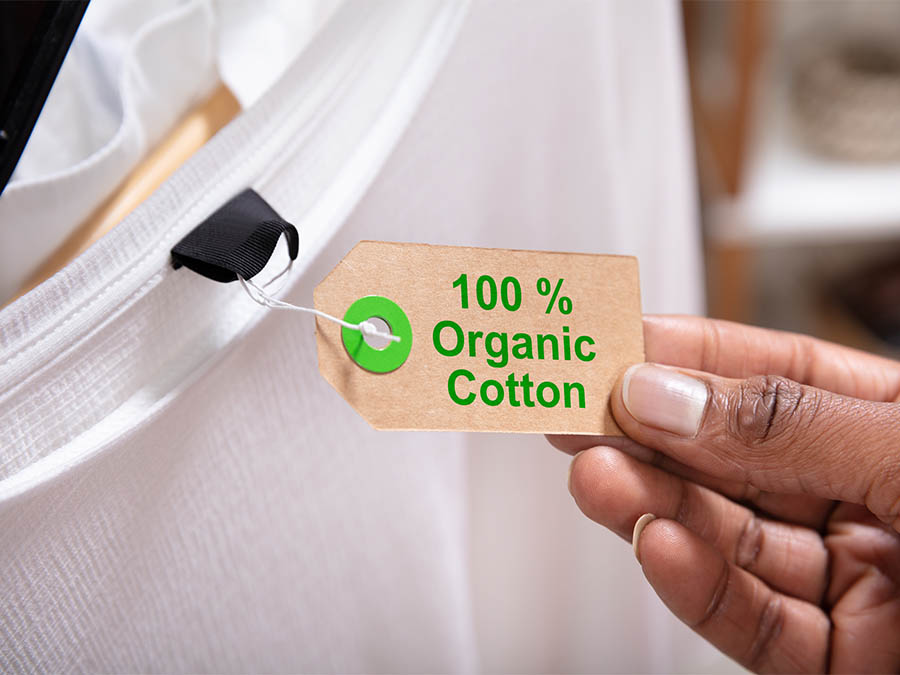All You Need to Know About Organic Cotton
Organic cotton is a type of cotton grown using environmentally friendly and sustainable practices.
It is an alternative to conventionally grown cotton, which often involves the use of synthetic pesticides and fertilisers. Here at sustainablefashion.ie we explain everything you need to know about organic cotton.
Different Types of Organic Cotton
There are several types of organic cotton, mainly differentiated by the specific farming and certification methods. Some of the most common types include
1. GOTS Certified Organic Cotton
GOTS stands for the Global Organic Textile Standard. It’s one of the most widely recognised and stringent certifications for organic textiles.
GOTS-certified organic cotton ensures that the entire production process, from farming to processing and labelling, meets strict environmental and social criteria.
2. USDA Certified Organic Cotton
In the United States, the Department of Agriculture (USDA) certifies organic cotton. This certification ensures that cotton farming adheres to organic standards, avoiding synthetic chemicals and GMOs.
3. Fair Trade Organic Cotton
Fair Trade certification ensures not only the organic cultivation of cotton but also fair and ethical treatment of farmers and workers throughout the production process. It helps promote better wages and working conditions for those involved in cotton farming.
4. Non-GMO Organic Cotton
Some organic cotton is specifically labeled as non-GMO (genetically modified organism). This means that the cotton seeds used for planting have not been genetically modified.
5. Transitional Organic Cotton
Some cotton farms are in the process of transitioning from conventional to organic farming methods.
Transitional organic cotton may not yet meet all the criteria for full organic certification but is on the path toward becoming fully organic.
6. Regenerative Organic Cotton
This type of cotton goes beyond organic farming to focus on regenerative agriculture practices. It aims to improve soil health, sequester carbon, and enhance biodiversity while growing cotton organically.
7. Biodynamic Organic Cotton
Biodynamic farming is a holistic approach that goes beyond organic practices, emphasizing ecological harmony and balance. The cotton is grown in alignment with lunar cycles and other biodynamic principles.
8. Sustainable Cotton
While not always labelled as “organic,” some cotton is grown using sustainable and environmentally responsible practices. This may include using reduced water, synthetic inputs, and minimal impact on the ecosystem.
9. Certified Chemical-Free Cotton
This type of cotton goes beyond avoiding synthetic pesticides and includes avoiding all chemical inputs during farming and processing.
It’s important to note that different regions and organizations may have their own certifications and standards for organic cotton.
When purchasing organic cotton products, look for the appropriate certification labels to ensure the authenticity of the organic claim.
What Qualifies as Organic Cotton
Now you know the different types of organic cotton, let’s take a look at what organic cotton really is.
1. Cultivation Practices
- No Synthetic Chemicals: Organic cotton is grown without the use of synthetic pesticides, herbicides, or genetically modified organisms (GMOs)
- Non-GMO Seeds: Organic cotton is typically cultivated from non-GMO cotton seeds.
2. Sustainable Farming Methods
- Crop Rotation: Organic cotton farming often involves crop rotation and other natural methods to reduce soil degradation and pests.
- Biological Pest Control: Instead of chemicals, organic cotton farming may use natural predators to control pests.
3. Environmental Benefits
- Reduced Chemical Use: By avoiding synthetic pesticides and fertilizers, organic cotton farming reduces the environmental impact and minimizes harm to ecosystems.
- Soil Health: Organic farming practices help maintain and improve soil fertility, which is essential for long-term sustainability.
4. Health Benefits
- Safe for Farmers: Organic cotton farming is safer for farmers and farmworkers, as they are not exposed to harmful synthetic chemicals.
- Better for Consumers: Products made from organic cotton are less likely to contain chemical residues, making them safer for consumers, especially those with sensitive skin.
5. Quality and Durability
- Quality Fibre: Organic cotton is praised for its high-quality fibre, which is softer and durable than conventionally grown cotton.
- Longevity: Organic cotton products can have a longer lifespan due to the absence of harsh chemicals that can weaken the fibers.
6. Certification
- Global Organic Textile Standard (GOTS): Many organic cotton products are certified by GOTS, which ensures that the entire supply chain meets strict organic and environmental standards.
7. Fair Trade
- •Some organic cotton is produced through fair trade practices, ensuring that farmers receive fair compensation for their work.
8. Ethical and Social Responsibility
- •Organic cotton is often associated with ethical and socially responsible production, addressing issues like child labor and poor working conditions in the textile industry.
9. Biodegradability
- Organic cotton is biodegradable, which means that at the end of its life cycle, it can decompose naturally without leaving harmful residues.
10. Market and Availability
- Organic cotton products are widely available, including clothing, bedding, and personal care items.
- They are often priced slightly higher than conventionally grown cotton. This is due to the costs associated with organic farming practices.
11. Consumer Awareness
- Demand for organic cotton is driven by increased consumer awareness of environmental and health concerns.
12. Challenges
- Organic cotton farming typically yields lower quantities than conventional methods. This can make it more expensive.
- Transitioning from conventional to organic farming can be challenging for farmers.
Finally
Organic cotton is an eco-friendly and socially responsible alternative to conventionally grown cotton, offering benefits for the environment, farmers, and consumers.
Its cultivation and production methods aim to reduce the ecological footprint of the textile industry and provide consumers with a safer and more sustainable choice.






